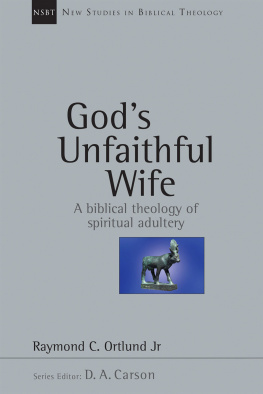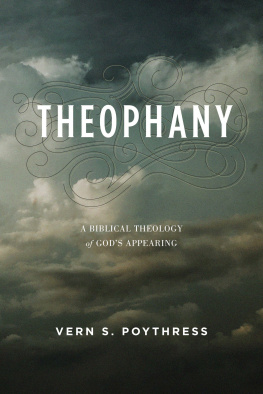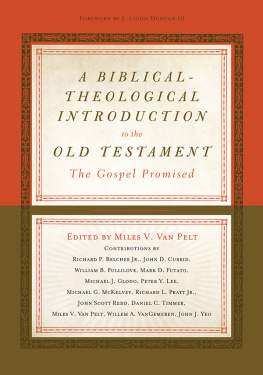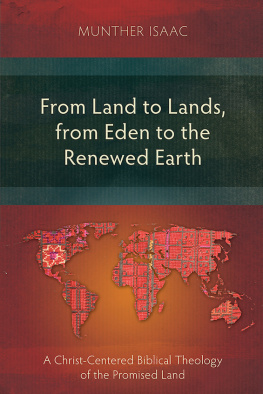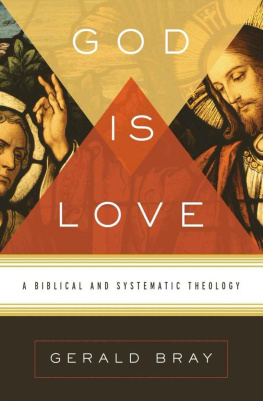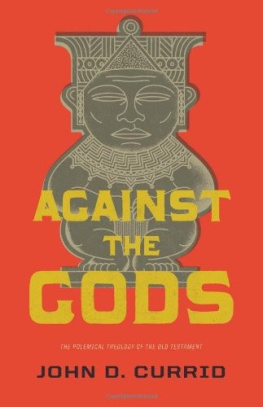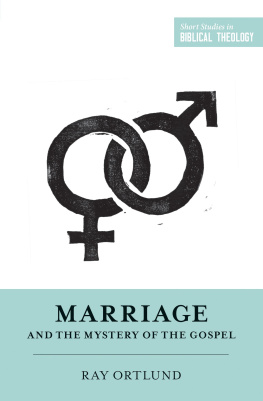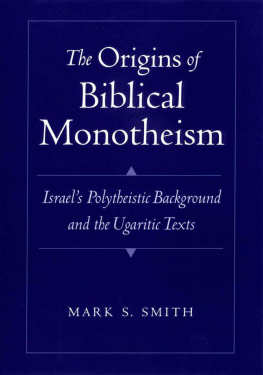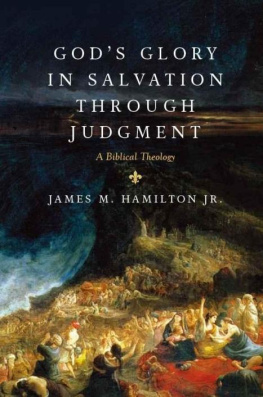Sommaire
Pagination de l'dition papier
Guide
Titles in this series:
1 Possessed by God, David Peterson
2 Gods Unfaithful Wife, Raymond C. Ortlund Jr
3 Jesus and the Logic of History, Paul W. Barnett
4 Hear, My Son, Daniel J. Estes
5 Original Sin, Henri Blocher
6 Now Choose Life, J. Gary Millar
7 Neither Poverty nor Riches, Craig L. Blomberg
8 Slave of Christ, Murray J. Harris
9 Christ, our Righteousness, Mark A. Seifrid
10 Five Festal Garments, Barry G. Webb
11 Salvation to the Ends of the Earth, Andreas J. Kstenberger and Peter T. OBrien
12 Now My Eyes Have Seen You, Robert S. Fyall
13 Thanksgiving, David W. Pao
NEW STUDIES IN BIBLICAL THEOLOGY 2
Series editor: D. A. Carson
Gods Unfaithful Wife
A BIBLICAL THEOLOGY
OF SPIRITUAL ADULTERY
Raymond C. Ortlund Jr
InterVarsity Press, USA
P.O. Box 1400,
Downers Grove, IL 60515-1426, USA
ivpress.com
1996 by Raymond C. Ortlund Jr.
All rights reserved. No part of this publication may be reproduced, stored in a retrieval system or transmitted in any form or by any means, electronic, mechanical, photocopying, recording or otherwise, without the prior permission of InterVarsity Press.
InterVarsity Press, USA, is the book-publishing division of InterVarsity Christian Fellowship/USA, a movement of students and faculty active on campus at hundreds of universities, colleges and schools of nursing in the United States of America, and a member movement of the International Fellowship of Evangelical Students. For information about local and regional activities, visit intervarsity.org.
The Scripture quotations marked rsv are from the Revised Standard Version of the Bible, copyright 1946, 1952, 1971 by the Division of Christian Education of the National Council of the Churches of Christ in the U.S.A. Used by permission. All rights reserved. Scripture quotations marked nrsv are from the New Revised Standard Version of the Bible, copyright 1989 by the Division of Christian Education of the National Council of the Churches of Christ in the USA. Used by permission. All rights reserved. (Italics are added by the author.)
First published under the title Whoredom: Gods Unfaithful Wife in Biblical Theology in 1996; reprinted under the title Gods Unfaithful Wife: A Biblical Theology of Spiritual Adultery in 2002.
ISBN: 978-0-8308-8217-5 (digital)
ISBN: 978-0-8308-2614-8 (print)
This digital document has been produced by Nord Compo.
Series preface
New Studies in Biblical Theology is a series of monographs that address key issues in the discipline of biblical theology. Contributions to the series focus on one or more of three areas: 1. the nature and status of biblical theology, including its relations with other disciplines (e.g. historical theology, exegesis, systematic theology, historical criticism, narrative theology); 2. the articulation and exposition of the structure of thought of a particular biblical writer or corpus; and 3. the delineation of a biblical theme across all or part of the biblical corpora.
Above all these monographs are creative attempts to help thinking Christians understand their Bibles better. The series aims simultaneously to instruct and to edify, to interact with the current literature, and to point the way ahead. In Gods universe, mind and heart should not be divorced: in this series we will try not to separate what God has joined together. While the footnotes interact with the best of the scholarly literature, the text is uncluttered with untransliterated Greek and Hebrew, and tries to avoid too much technical jargon. The volumes are written within the framework of confessional evangelicalism, but there is always an attempt at thoughtful engagement with the sweep of the relevant literature.
This volume, the second in the series, traces out a biblical theme that has been largely overlooked in this century. My colleague Dr Ray Ortlund has combined scholarly and pastoral gifts to examine afresh what it means to confess that Yahweh is the Bridegroom of his covenant people Israel, and that Christ is the Bridegroom of the church. Not only does the development of this theme link large swathes of the canon together, but it simultaneously discloses the profoundly personal nature of Gods covenanted love, exposes the odium of spiritual adultery (whoredom), and, conversely, enriches our view of marriage.
D. A. Carson
Trinity Evangelical Divinity School,
Deerfield, Illinois
Preface
What the biblical writers lacked in diplomacy they made up for in pungency. However indelicate the form of their accusations against the people of God, their bold vision matched the offence they aimed to expose. The people covenanted to God are guilty of spiritual adultery. The wife of God has become a whore.
Formerly a more prominent theme in theological discourse and pastoral ministry than it is today, discussion of the vision of God as the husband of his people, with all that such a relationship entails for them, has recently been reopened by Nelly Stienstra in her 1993 monograph, YHWH is the Husband of his People. The following study was initially prompted by her excellent work but soon struck off in its own direction as an exposition of the biblical theme of harlotry toward God. What begins as Pentateuchal whispers rises later to prophetic cries and is eventually echoed in apostolic teaching. That message proclaims that, if Yahweh is the husband of his people, then their lapses from faithfulness to him may properly be regarded as the moral equivalent to whoredom. Such an analysis is not pleasant to the sensibilities. It may at first seem a strident exaggeration; but is is clearly declared in Scripture and offers a searching assessment of the nature of human sin which our own age has largely overlooked or even forgotten. Alternatively, the marital nature of the covenant intimates depths of communion with God for which the human soul yearns amid the barrenness of the modern world.
In order for unfaithfulness to God, branded as whoredom, to be meaningful, it is necessary to begin this study by setting forth the logic of human marriage as explained by Scripture. This understanding of the human marital bond provides the covenant community with the premise and ideal standard from which they may extrapolate in their thinking about their relationship with God. If a proper marriage makes visible nothing less than a one flesh union, and if the covenant communitys relationship with God is of a marital nature, then failure to live out complete union of the soul with God may be regarded as whoredom. Chapter 1, therefore, will expound Genesis 2:23-24, the foundational passage explaining the principial essence of human marriage.
Chapter 2 will open up a most striking fact. As the Pentateuch unfolds, it portrays Israels relationship with God in terms which rely upon the desirability and moral authority of marital fidelity. The fact that God is the husband of his people is not yet fully disclosed; it is assumed. But the Pentateuch, flowing into the Deuteronomistic history, openly declares that, when the people of God share their devotion with any other than Yahweh, they commit whoredom.
What is suggested in the Pentateuch and historical books, then, is more fully and boldly developed by the prophets. Chapter 3 will expound the burden of Hosea 1 3 in this regard, and chapters 4 and 5 will survey other prophets.

